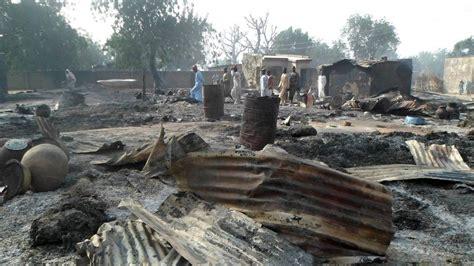
Suicide Bombings in Borno Continue Despite Boko Haram’s Surrender
Borno State, Nigeria, has been the epicenter of deadly terrorist attacks since 2009 when Boko Haram’s leader, Mohammed Yusuf, began his radical preachings in Maiduguri.
Despite recent surrenders by Boko Haram and its splinter group, the Islamic State West Africa Province (ISWAP), the violence continues unabated.
The recent suicide bombing in Gwoza Local Government Area on Saturday, which claimed the lives of innocent civilians and resulted in numerous casualties, underscores the ongoing threat.
The economy of Borno State has been severely crippled due to continuous terrorist attacks.
While the surrender of Boko Haram and ISWAP fighters happens almost daily, it has not translated into a reduction in violence.
This raises questions about the effectiveness of the surrenders and the rehabilitation process.
The surrendering terrorists undergo a rehabilitation process and are eventually released back into society.
However, there are concerns that some of these so-called “repentant” terrorists may return to their groups or become informants, providing valuable intelligence to facilitate future attacks.
The recent attack in Gwoza suggests that terrorists may be planning something significant.
According to security analyst Zagazola Makama, last week there are about 30 suicide bombers currently at large in Borno State, with their next targets unknown.
This situation indicates that Boko Haram and ISWAP still possess considerable operational capability despite the surrender.
In response to the Gwoza attack, the Federal and State Governments have issued statements condemning the violence and expressing sympathy for the victims.
However, the people of Borno and other affected regions demand more than just words. They want decisive action to combat terrorism and restore security.
The issue of insecurity is not confined to Borno State alone. Other regions, such as the South East, North West, and North East, are also grappling with increasing violence.
Nigerians are facing multiple crises, including hunger, economic hardship, and insecurity. There is an urgent need for the Federal Government to take comprehensive measures to address the security situation in Borno and across the country.
Failure to do so risks the possibility of terrorists gaining more ground in the Northern regions.
The government has repeatedly assured citizens of its commitment to tackling terrorism. However, the persistent attacks demonstrate that current strategies may not be sufficient.
There is a need for a more robust and coordinated approach involving better intelligence gathering, increased military presence, and community engagement.
The surrender of Boko Haram and ISWAP fighters has not led to a decrease in terrorist activities in Borno State.
The recent suicide bombing in Gwoza is a stark reminder of the ongoing threat. The Federal and State Governments must take immediate and decisive action to address this issue, ensuring the safety and security of all Nigerians.
Source » thenews-chronicle.com





